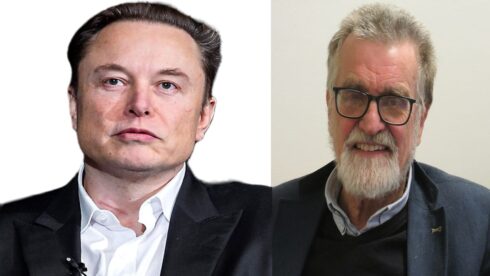MAGA billionaire Elon Musk’s has once again thrown himself into controversy, this time targeting Andreas Mogensen, a highly respected International Space Station (ISS) commander. The feud erupted when Mogensen called out Musk for falsely claiming that two astronauts were stranded in space due to “political reasons.” Rather than backing his claim with facts, Elon Musk resorted to a crude insult, calling Mogensen “fully retarded” in a public outburst on X (formerly Twitter).
Elon Musk’s inflammatory rhetoric was in response to a video clip where he told Fox News host Sean Hannity that the Biden administration had deliberately delayed the return of astronauts Butch Wilmore and Suni Williams. Mogensen, unimpressed with Elon Musk’s misinformation, labeled it as an outright lie. This simple correction sent the SpaceX CEO into a tirade, showcasing his well-documented tendency to lash out at critics rather than engaging in rational discourse.
Musk’s Attempt to Rewrite Space History
Mogensen’s measured response laid out the facts plainly: Wilmore and Williams were always scheduled to return with Crew-9, the mission plan set in motion as early as September 2023. Despite Musk’s grandstanding, SpaceX was never actually planning a special “rescue” mission. Instead of admitting his exaggeration, Elon Musk doubled down, insisting that the delay was politically motivated and that he had personally offered to bring the astronauts back months ago—a claim he provided no evidence for.
Elon Musk’s distortion of reality fits a familiar pattern. He often inflates his role in major events, whether claiming credit for Ukraine’s Starlink defense operations or portraying himself as the singular genius behind Tesla and SpaceX’s successes. His spat with Mogensen was no different: a desperate attempt to frame himself as the hero against a so-called corrupt establishment, despite the objective facts proving otherwise.
The Pattern of Elon Musk’s Verbal Attacks
Elon Musk’s response to criticism has become increasingly erratic, often resorting to personal insults instead of substantive counterpoints. His attack on Mogensen is just the latest in a string of feuds where he has hurled derogatory remarks at experts and industry professionals who challenge him.
Beyond calling Mogensen “retarded,” Elon Musk dismissed him as a mere “passenger” who “doesn’t know his ass from a hole in the ground.” This kind of language is not new for Elon Musk, who has previously attacked journalists, scientists, and even his own employees with similar venom. His behavior underscores a deep-seated insecurity—whenever faced with legitimate pushback, he pivots to mockery rather than evidence-based debate.
Musk’s Unhinged Threat to the International Space Station
Shortly after the feud escalated, Elon Musk took his outrage a step further, calling for the “deorbiting” of the ISS. In a post dripping with apparent vindictiveness, Elon Musk declared that the space station had “served its purpose” and that its continued operation had “very little incremental utility.”
The timing of this statement is telling. Just hours after being publicly embarrassed by Mogensen, Elon Musk suddenly declared that the ISS—a symbol of international cooperation in space exploration—should be scrapped. Whether this was an idle threat or a genuine policy stance remains unclear, but it showcases Musk’s growing tendency to treat global infrastructure as his personal plaything, reacting emotionally rather than rationally to perceived slights.
Elon Musk’s Political Agenda and the Trump Connection
This latest controversy also raises questions about Elon Musk’s increasing alignment with far-right political figures. His framing of the ISS return delay as a “Biden administration” failure plays directly into MAGA conspiracy theories that paint Democrats as incompetent villains. Elon Musk’s rhetoric echoes the same partisan outrage that fuels Trump’s base, suggesting a calculated move to curry favor with right-wing power brokers.
Trump himself has praised Elon Musk repeatedly, even hinting at a role for him in a future administration. Given Elon Musk’s erratic behavior and habit of spreading misinformation, his potential involvement in government decision-making is deeply concerning. His latest spat with Mogensen—where facts took a backseat to ego—only reinforces the risks of giving him any level of political influence.
The Broader Implications of Elon Musk’s Ego-Driven Leadership
Elon Musk’s SpaceX is undeniably a major player in the future of space exploration, but his behavior raises serious questions about his fitness to lead such a crucial enterprise. If the man in charge of America’s most advanced private space program cannot handle a simple factual correction without resorting to childish insults, how can he be trusted with missions that carry global consequences?
His impulsive leadership style, fueled by grudges and personal vendettas, is a liability. The fact that he would go so far as to suggest dismantling the ISS simply because an astronaut embarrassed him highlights the dangers of unchecked billionaire influence. The world needs space leaders driven by science and cooperation—not by Twitter feuds and political gamesmanship.














